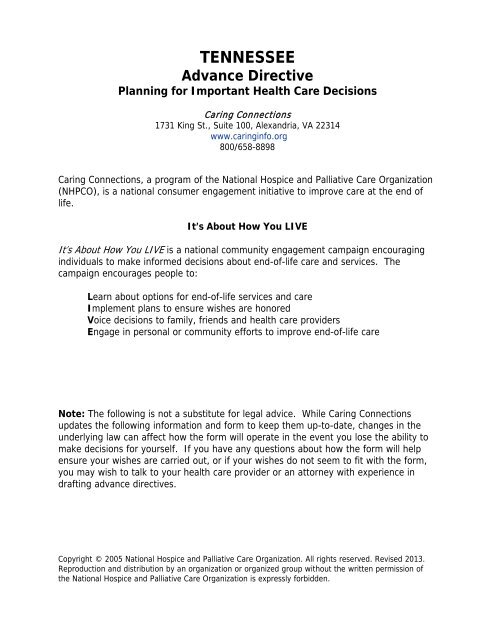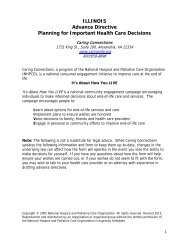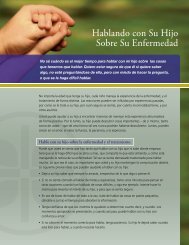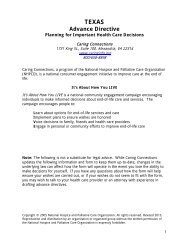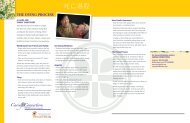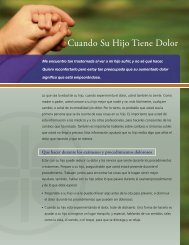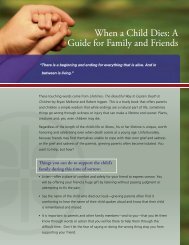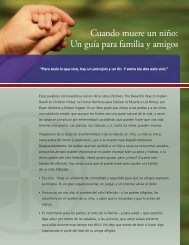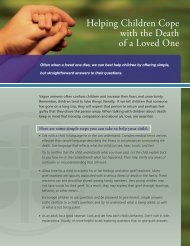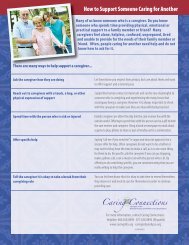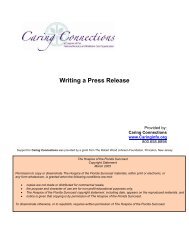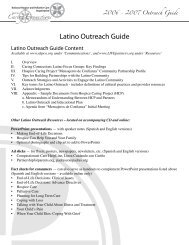Tennessee - Caring Connections
Tennessee - Caring Connections
Tennessee - Caring Connections
You also want an ePaper? Increase the reach of your titles
YUMPU automatically turns print PDFs into web optimized ePapers that Google loves.
TENNESSEE<br />
Advance Directive<br />
Planning for Important Health Care Decisions<br />
<strong>Caring</strong> <strong>Connections</strong><br />
1731 King St., Suite 100, Alexandria, VA 22314<br />
www.caringinfo.org<br />
800/658-8898<br />
<strong>Caring</strong> <strong>Connections</strong>, a program of the National Hospice and Palliative Care Organization<br />
(NHPCO), is a national consumer engagement initiative to improve care at the end of<br />
life.<br />
It’s About How You LIVE<br />
It’s About How You LIVE is a national community engagement campaign encouraging<br />
individuals to make informed decisions about end-of-life care and services. The<br />
campaign encourages people to:<br />
Learn about options for end-of-life services and care<br />
Implement plans to ensure wishes are honored<br />
Voice decisions to family, friends and health care providers<br />
Engage in personal or community efforts to improve end-of-life care<br />
Note: The following is not a substitute for legal advice. While <strong>Caring</strong> <strong>Connections</strong><br />
updates the following information and form to keep them up-to-date, changes in the<br />
underlying law can affect how the form will operate in the event you lose the ability to<br />
make decisions for yourself. If you have any questions about how the form will help<br />
ensure your wishes are carried out, or if your wishes do not seem to fit with the form,<br />
you may wish to talk to your health care provider or an attorney with experience in<br />
drafting advance directives.<br />
Copyright © 2005 National Hospice and Palliative Care Organization. All rights reserved. Revised 2013.<br />
Reproduction and distribution by an organization or organized group without the written permission of<br />
the National Hospice and Palliative Care Organization is expressly forbidden.
Using these Materials<br />
BEFORE YOU BEGIN<br />
1. Check to be sure that you have the materials for each state in which you may receive<br />
health care.<br />
2. These materials include:<br />
• Instructions for preparing your advance directive, please read all the<br />
instructions.<br />
• Your state-specific advance directive forms, which are the pages with the gray<br />
instruction bar on the left side.<br />
ACTION STEPS<br />
1. You may want to photocopy or print a second set of these forms before you start so<br />
you will have a clean copy if you need to start over.<br />
2. When you begin to fill out the forms, refer to the gray instruction bars — they will<br />
guide you through the process.<br />
3. Talk with your family, friends, and physicians about your advance directive. Be sure<br />
the person you appoint to make decisions on your behalf understands your wishes.<br />
4. Once the form is completed and signed, photocopy the form and give it to the person<br />
you have appointed to make decisions on your behalf, your family, friends, health care<br />
providers and/or faith leaders so that the form is available in the event of an<br />
emergency.<br />
5. You may also want to save a copy of your form in an online personal health records<br />
application, program, or service that allows you to share your medical documents with<br />
your physicians, family, and others who you want to take an active role in your<br />
advance care planning.<br />
2
INTRODUCTION TO YOUR TENNESSEE ADVANCE DIRECTIVE<br />
This packet contains a legal document, known as a <strong>Tennessee</strong> Advance Directive, that<br />
protects your right to refuse medical treatment you do not want, or to request treatment<br />
you do want, in the event you lose the ability to make decisions yourself. This document<br />
is based on forms created by the <strong>Tennessee</strong> Department of Health.<br />
Page one includes an Appointment of Health Care Agent. This lets you name<br />
someone, called an agent, to make decisions about your medical care — including<br />
decisions about life support — if you can no longer speak for yourself. An agent can<br />
speak for you any time you are unable to make your own medical decisions, not only at<br />
the end of life.<br />
Pages two and three contain an Individual Instruction that lets you provide your<br />
wishes regarding medical care in the event that you can no longer speak for yourself. In<br />
addition to health care decisions, the individual instruction portion of the form also allows<br />
you to give instructions regarding your other advance planning concerns, such as your<br />
burial wishes. Finally, the individual instruction portion of the form allows you to make a<br />
declaration of your wishes regarding organ donation.<br />
Your advance directive goes into effect when your designated physician determines that<br />
you are no longer able to understand the significant benefits, risks, and alternatives to<br />
proposed health care and to make and communicate a health care decision.<br />
This form does not expressly address mental illness. If you would like to make advance<br />
care plans involving mental illness, you should talk to your physician and an attorney<br />
about a Declaration for Mental Health Treatment. The <strong>Tennessee</strong> Department of Mental<br />
Health and Developmental Disabilities has published a form declaration for mental health<br />
treatment at www.state.tn.us/mental/t33/DHMT_FORM.pdf and a guide to the form at<br />
www.state.tn.us/mental/t33/DMHT_bro.pdf.<br />
Note: These documents will be legally binding only if the person completing them is a<br />
competent adult, 18 years or older, or an emancipated minor.<br />
3
COMPLETING YOUR TENNESSEE ADVANCE DIRECTIVE<br />
Whom should I appoint as my agent<br />
Your agent is the person you appoint to make decisions about your medical care if you<br />
become unable to make those decisions yourself. Your agent may be a family member or<br />
a close friend whom you trust to make serious decisions. The person you name as your<br />
agent should clearly understand your wishes and be willing to accept the responsibility of<br />
making medical decisions for you.<br />
You can appoint a second person as your alternate agent. The alternate will step in if the<br />
first person you name as an agent is unable, unwilling, or unavailable to act for you.<br />
How do I make my <strong>Tennessee</strong> Advance Directive legal<br />
You must sign your advance directive. Your signature must either be notarized or<br />
witnessed by two competent adults. Either option is available with this form.<br />
If you have your signature witnessed, the witnesses cannot be the person you name as<br />
your agent. In addition, at least one of your witnesses must be a person 1) who is not<br />
related to you by blood, marriage, or adoption; and 2) who will not inherit any part of<br />
your estate.<br />
Should I add personal instructions to my <strong>Tennessee</strong> Advance Directive<br />
One of the strongest reasons for naming an agent is to have someone who can respond<br />
flexibly as your medical situation changes and deal with situations that you did not<br />
foresee. If you add instructions to this document it may help your agent carry out your<br />
wishes, but be careful that you do not unintentionally restrict your agent’s power to act in<br />
your best interest. In any event, be sure to talk with your agent about your future<br />
medical care and describe what you consider to be an acceptable “quality of life.”<br />
What if I change my mind<br />
You may revoke all or part of your advance directive, except for the designation of an<br />
agent, at any time you have capacity and in any manner that communicates an intent to<br />
revoke. This could include tearing, burning, or otherwise destroying the document or<br />
simply stating orally that you intend to revoke your advance directive.<br />
You may revoke the designation of your agent only by a signed writing or by personally<br />
informing your supervising health care provider. If your spouse is your agent, a decree<br />
of annulment, divorce, dissolution of marriage, or legal separation automatically revokes<br />
his or her power, unless you specify otherwise in your advance directive.<br />
You can also draft a new advance directive. An advance directive that conflicts with an<br />
earlier advance directive revokes the earlier directive to the extent of the conflict.<br />
4
TENNESSEE ADVANCE DIRECTIVE<br />
PAGE 1 OF 5<br />
APPOINTMENT OF HEALTH CARE AGENT<br />
INSERT YOUR NAME<br />
ADD YOUR AGENT’S<br />
NAME, PHONE<br />
NUMBER, RELATION<br />
TO YOU, AND<br />
ADDRESS<br />
I, _________________________________, give my agent named below<br />
permission to make health care decisions for me if I cannot make decisions for<br />
myself. If my agent is unavailable or is unable or unwilling to serve, the alternate<br />
named below will take the agent’s place.<br />
Agent:<br />
Name: _____________________________ Phone #: _____________________<br />
Relation: ___________________________<br />
Address:<br />
___________________________________________________________________<br />
___________________________________________________________________<br />
Alternate Agent:<br />
ADD YOUR<br />
ALTERNATE<br />
AGENT’S NAME,<br />
PHONE NUMBER,<br />
RELATION TO YOU,<br />
AND ADDRESS<br />
Name: _____________________________ Phone #: _____________________<br />
Relation: ____________________________<br />
Address:<br />
___________________________________________________________________<br />
___________________________________________________________________<br />
Other Instructions or Limitations for my Agent:<br />
ADD ANY<br />
LIMITATIONS OR<br />
INSTRUCTIONS YOU<br />
HAVE FOR YOUR<br />
AGENT<br />
© 2005 National<br />
Hospice and<br />
Palliative Care<br />
Organization<br />
2013 Revised.<br />
5
TENNESSEE ADVANCE DIRECTIVE<br />
PAGE 2 OF 5<br />
INDIVIDUAL INSTRUCTION<br />
INSERT YOUR NAME<br />
QUALITY OF LIFE<br />
STATEMENT<br />
CHECK THE BOXES<br />
FOR CONDITIONS<br />
THAT YOU DO NOT<br />
CONSIDER AN<br />
ACCEPTABLE<br />
QUALITY OF LIFE<br />
YOU CAN CHECK AS<br />
MANY OF THESE<br />
ITEMS AS YOU<br />
WANT, OR ADD<br />
ADDITIONAL<br />
CONDITIONS IN<br />
THE “OTHER<br />
INSTRUCTIONS”<br />
SECTION BELOW<br />
TREATMENT<br />
INSTRUCTIONS<br />
I, ____________________________________, hereby give these individual<br />
instructions on how I want to be treated by my doctors and other health care<br />
providers when I can no longer make those treatment decisions myself.<br />
I want my doctors to help me maintain an acceptable quality of life including<br />
adequate pain management. I do not consider the following conditions to be an<br />
acceptable quality of life:<br />
<br />
<br />
<br />
<br />
Permanent Unconscious Condition: I become totally unaware of people<br />
or surroundings with little chance of ever waking up from the coma.<br />
Permanent Confusion: I become unable to remember, understand, or<br />
make decisions. I do not recognize loved ones or cannot have a clear<br />
conversation with them.<br />
Dependent in all Activities of Daily Living: I am no longer able to talk<br />
clearly or move by myself. I depend on others for feeding, bathing,<br />
dressing, and walking. Rehabilitation or any other restorative treatment will<br />
not help.<br />
End-Stage Illnesses: I have an illness that has reached its final stages in<br />
spite of full treatment. Examples: Widespread cancer that does not respond<br />
anymore to treatment; chronic and/or damaged heart and lungs, where<br />
oxygen is needed most of the time and activities are limited due to a feeling<br />
of suffocation.<br />
If my condition is irreversible – that is, it will not improve – I direct that medically<br />
appropriate treatment be provided as indicated below. If I mark “No” below, I<br />
authorize the withholding or withdrawal of such care:<br />
CHECK THE “YES”<br />
BOXES IF YOU<br />
WANT TO RECEIVE<br />
THE TREATMENT<br />
<br />
Yes<br />
<br />
No<br />
CPR (Cardiopulmonary Resuscitation): To make the heart beat<br />
again and restore breathing after it has stopped. Usually this<br />
involves electric shock, chest compressions, and breathing<br />
assistance.<br />
CHECK THE “NO”<br />
BOXES IF YOU DO<br />
NOT WANT TO<br />
RECEIVE THE<br />
TREATMENT<br />
© 2005 National<br />
Hospice and<br />
Palliative Care<br />
Organization<br />
2013 Revised.<br />
<br />
Yes<br />
<br />
Yes<br />
<br />
Yes<br />
<br />
No<br />
<br />
No<br />
<br />
No<br />
Life Support / Other Artificial Support: Continuous use of<br />
breathing machine, IV fluids, medications, and other equipment that<br />
helps the lungs, heart, kidneys, and other organs to continue to<br />
work.<br />
Treatment of New Conditions: Use of surgery, blood<br />
transfusions, or antibiotics that will deal with a new condition but will<br />
not help the primary illness.<br />
Artificially Provided Nourishment and Fluids: Use of tubes to<br />
deliver food and water to patient’s stomach or use of IV fluids into a<br />
vein which would include artificially delivered nutrition and hydration.<br />
6
Other Instructions (Optional):<br />
TENNESSEE ADVANCE DIRECTIVE<br />
PAGE 3 OF 5<br />
OTHER INSTRUCTIONS<br />
ADD OTHER<br />
INSTRUCTIONS, IF<br />
ANY, REGARDING<br />
YOUR ADVANCE<br />
CARE PLANS<br />
THESE<br />
INSTRUCTIONS CAN<br />
FURTHER ADDRESS<br />
YOUR HEALTH CARE<br />
PLANS, SUCH AS<br />
YOUR WISHES<br />
REGARDING<br />
HOSPICE<br />
TREATMENT, BUT<br />
CAN ALSO ADDRESS<br />
OTHER ADVANCE<br />
PLANNING ISSUES,<br />
SUCH AS YOUR<br />
BURIAL WISHES<br />
ATTACH<br />
ADDITIONAL PAGES<br />
IF NEEDED<br />
Organ Donation (Optional)<br />
CHECK THE<br />
APPROPRIATE<br />
BOXES<br />
IF YOU WANT TO<br />
LIMIT YOUR<br />
ANATOMICAL GIFT,<br />
INDICATE THE<br />
LIMITATION HERE.<br />
Upon my death, I DO NOT wish to make an anatomical gift<br />
Upon my death, I wish to make the following anatomical gift (please mark<br />
one):<br />
Any organ/tissue My entire body Only the following organs/tissues:<br />
© 2005 National<br />
Hospice and<br />
Palliative Care<br />
Organization<br />
2013 Revised.<br />
7
TENNESSEE ADVANCE DIRECTIVE<br />
PAGE 4 OF 5<br />
SIGNATURE<br />
Your signature must either be witnessed by two competent adults (Option A,<br />
below) or notarized (Option B, below). If witnessed, neither witness may be<br />
the person you appointed as your agent, and at least one of the witnesses<br />
must be someone who is not related to you by blood, marriage, or adoption<br />
or entitled to any part of your estate.<br />
PRINT YOUR NAME<br />
SIGN AND DATE<br />
YOUR ADVANCE<br />
DIRECTIVE<br />
OPTION A: SIGN WITH WITNESSES<br />
_____________<br />
Principal’s name (please print or type)<br />
_____________________________________________________________<br />
Signature of Principal<br />
Date<br />
(must be at least 18 or emancipated minor)<br />
SIGNATURE OF<br />
WITNESS 1<br />
I am a competent adult and have not been named as the Principal’s agent.<br />
I witnessed the Principal’s signature on this form.<br />
_____________________________________________________________<br />
Signature of witness number 1<br />
Date<br />
SIGNATURE OF<br />
WITNESS 2<br />
© 2005 National<br />
Hospice and<br />
Palliative Care<br />
Organization<br />
2013 Revised.<br />
I am a competent adult and have not been named as the Principal’s agent.<br />
I am not related to the Principal by blood, marriage, or adoption and I am<br />
not entitled to any portion of the Principal’s estate upon his or her death<br />
under any existing will or codicil or by operation of law. I witnessed the<br />
Principal’s signature on this form.<br />
_____________________________________________________________<br />
Signature of witness number 2<br />
Date<br />
8
TENNESSEE ADVANCE DIRECTIVE<br />
PAGE 5 OF 5<br />
OPTION B: SIGN BEFORE A NOTARY<br />
PRINT YOUR NAME<br />
_____________<br />
Principal’s name (please print or type)<br />
SIGN AND DATE<br />
YOUR ADVANCE<br />
DIRECTIVE<br />
_____________________________________________________________<br />
Signature of Principal<br />
Date<br />
STATE OF TENNESSEE<br />
COUNTY OF<br />
______<br />
HAVE YOUR<br />
SIGNATURE<br />
NOTARIZED<br />
I am a Notary Public in and for the State and County named above. The<br />
person who signed this instrument is personally known to me (or proved to<br />
me on the basis of satisfactory evidence) to be the person whose name is<br />
shown above as the “Principal.” The Principal personally appeared before<br />
me and signed above or acknowledged the signature above as his or her<br />
own. I declare under penalty of perjury that the Principal appears to be of<br />
sound mind and under no duress, fraud, or undue influence.<br />
My commission expires:<br />
____________<br />
Signature of Notary Public<br />
_______________________________<br />
© 2005 National<br />
Hospice and<br />
Palliative Care<br />
Organization<br />
2013 Revised.<br />
9
You Have Filled Out Your Health Care Directive, Now What<br />
1. Your <strong>Tennessee</strong> Advance Directive is an important legal document. Keep the original<br />
signed document in a secure but accessible place. Do not put the original document in a<br />
safe deposit box or any other security box that would keep others from having access to<br />
it.<br />
2. Give photocopies of the signed original to your agent and alternate agent, doctor(s),<br />
family, close friends, clergy and anyone else who might become involved in your health<br />
care. If you enter a nursing home or hospital, have photocopies of your document placed<br />
in your medical records.<br />
3. Be sure to talk to your agent(s), doctor(s), clergy, family and friends about your wishes<br />
concerning medical treatment. Discuss your wishes with them often, particularly if your<br />
medical condition changes.<br />
4. You may also want to save a copy of your form in an online personal health records<br />
application, program, or service that allows you to share your medical documents with<br />
your physicians, family, and others who you want to take an active role in your advance<br />
care planning.<br />
5. If you want to make changes to your documents after they have been signed and<br />
witnessed, you must complete a new document.<br />
6. Remember, you can always revoke your <strong>Tennessee</strong> document.<br />
7. Be aware that your <strong>Tennessee</strong> document will not be effective in the event of a medical<br />
emergency. Ambulance and hospital emergency department personnel are required to<br />
provide cardiopulmonary resuscitation (CPR) unless they are given a separate directive<br />
that states otherwise. These directives called “prehospital medical care directives” or “do<br />
not resuscitate orders” are designed for people whose poor health gives them little<br />
chance of benefiting from CPR. These directives instruct ambulance and hospital<br />
emergency personnel not to attempt CPR if your heart or breathing should stop.<br />
Currently not all states have laws authorizing non-hospital do-not-resuscitate orders. We<br />
suggest you speak to your physician if you are interested in obtaining this form. <strong>Caring</strong><br />
<strong>Connections</strong> does not distribute these forms.<br />
10


